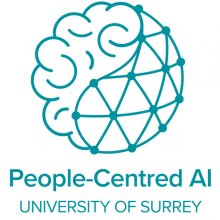

AI for society
How can AI transform business and the workplace for the benefit of society?
AI is disrupting business models and working practice with digital supply chains and new digital platforms leading to new value creation. The challenge is to understand the macroscale societal impact of the AI transformation and lead research and policy to ensure adoption of approaches which are inclusive, fair and benefit society.
Research will address AI for personal and societal security of the individual and their data, drawing on Surrey’s DECaDE National Centre for Decentralised Digital Economy.
Streamlining financial services

AI is improving efficiency in financial services by automating many operations, but it is vital that systems are unbiased, and designed with end-users in mind, according to Professor Bonnie Buchanan (Surrey Business School), who has been invited to share her research with the Bank of England and US Congress.
Recently, she has been funded by Innovate UK to apply AI to the UK mortgage industry, developing a ‘one-shop learning’ algorithm which could drastically cut down the administration involved for consumers, who typically need to show personal documents multiple times during the mortgage origination process.
Professor Buchanan says: “This technology could not only save time and reduce the environmental impact related to huge paper documents. It could also – very importantly – decrease transaction costs, helping low to middle-income households to access mortgages more easily.”
Fusing blockchain with AI for the public good

While much blockchain research focuses on cryptocurrencies, Surrey is taking a unique approach in this area by fusing blockchain (trusted data) with AI (making sense of that data) for the public good. Surrey Blockchain is at the forefront of Distributed Ledger Technology (DLT) with a research portfolio undertaking cross-disciplinary research that is transforming domains as diverse as digital records, healthcare, electronic voting, trust and identity.
Within this network researchers are exploring novel AI techniques for fingerprinting or ‘hashing’ data, and entrusting these hashes to DLTs to create a time-stamped, immutable record of the data. Applications include proving the provenance of images and video (for example to tamper-proof public archives and fight against deep fakes and dissemination of fabricated news), and proving an individual’s identity through behavioural fingerprinting of their social media activity.
As well as protecting us online, AI is helping to keep society safe in the physical world. Facial recognition technology is already widely used, for example at UK airports, but to date it has required subjects to be looking directly into a camera and standing completely still to be effective.
Biometrics experts within Surrey’s Centre for Vision, Speech and Signal Processing are addressing this challenge by developing solutions that exploit information such as face shape and texture, lip dynamics and soft biometrics to provide a more advanced solution. The Centre’s vision of developing ‘unconstrained’ facial recognition – which works regardless of image quality, lighting, environment, pose and other factors – is being brought to fruition under the EPSRC FACER2VN research programme in collaboration with the Home Office’s Centre for Applied Science and Technology.
AI for digital economy and business

For people to engage in newly-available AI-based services, there are significant trust issues to overcome. One of the research focuses within Surrey’s Centre of Digital Economy (CoDE) is the misalignment of interests and the asymmetry of power between service providers and users. This is preventing individuals from using personalised services because of concerns about the potential loss of control over personal information.
Surrey’s academics have proposed a system which promises to provide both privacy protection and personalised features by integrating the Hub-Of-All-Things (HAT) – a personal data store – with state-of-the-art AI technology for data search and understanding.
CoDE is also researching the use of AI in predicting future economic success. In the film industry, there is an increasing trend towards creating customer-centric services and products, and also co-creating content with the customer. CoDE’s researchers have developed an automated analysis system which uses machine reading of scripts to help authors edit the emotional journey of stories, with each journey model matched to its performance data (box office/critics/viewer journeys). The system enables writers to predict potential returns or reviews, which has significant implications for improving business outcomes in a highly competitive industry.
How AI is changing the laws of finance

Within the financial services sphere, AI and machine learning are creating a seismic shift in terms of the way that banks and other financial institutions engage with customers. Surrey Business School’s Department of Finance and Accounting is working in partnership with government and financial organisations to identify how AI is changing the financial services industry in areas such as fraud detection, banking chatbots and robo-advisors, algorithmic trading, and regulation and policy.
The Department’s academics recently contributed to an Alan Turing Report ‘AI in finance’, which explored the question of whether AI is so different from previous technological advances that it could actually upend the laws of finance. Leading on from this work, in June 2019, Head of Department Professor Bonnie Buchanan testified as a witness at the House of Financial Services’ Task Force on Artificial Intelligence at Capitol Hill in Washington DC.
Building a sustainable economy

Another factor driving much of Surrey’s research in the sphere of business is the need to balance economic development with sustainability. The Centre for Environment and Sustainability (CES) has a strong research focus on the 17 United Nations Sustainable Development Goals and their 232 indicators, and applies Earth observation, AI, machine learning and novel data management and mining techniques to this research. With a long history of using applied systems analysis such as life cycle assessment, CES is increasingly working with large datasets to answer sustainability challenges.
AI transforms how businesses operate

Quadruped robots and Unmanned Aerial Vehicles (UAVs) have started to appear on construction sites for surveying purposes. Pallets are moved by autonomous forklift-trucks in warehouses in a coordinated and optimal way. These are just a few examples of how AI is transforming the industry. Researchers at the Business Transformation department are exploring new ways of how AI can transform the future of business:
- AI for construction sites - data analytics, robotics, and automation;
- AI for bus services - new bus routes creation and service utilisation prediction;
- AI for vehicle routing - dynamic routing allows autonomous robots (electrical vehicles) to plan routes efficiently;
- AI for agriculture - smart farming and sustainable agriculture;
- AI for fraud detection - fast identification of transaction fraud.
Hospitality and tourism

AI is poised to radically transform how value is created in the hospitality and tourism industry. From optimising supply chain management and resource use to producing and delivering services in novel ways, companies in the sector are increasingly turning to intelligent machines.
There is a huge potential for automation in the sector, especially given its projected growth as more people than ever engage in travel. High reliance on manual labour, combined with a diminishing pool from which to recruit these workers (due to an ageing population and falling birth rates), is driving operators to automate some, or all, of their routine tasks. This poses important questions about the future of employment in the sector, especially in the context of the United Nations’ Sustainable Development Goal to ‘promote inclusive and sustainable economic growth, employment and decent work for all.'
Tackling AI problems
To tackle the social, economic and ethical problems arising from the use of AI technologies across the sector, Surrey’s School of Hospitality and Tourism Management – the leading School of its type in the UK – has launched several streams of research activity. Hack Hospitality, an industry-facing initiative backed by ESRC’s Industry Engagement Fund, has brought together policymakers, start-ups and representatives from a broad range of backgrounds (including hospitality, tourism, design, robotics and AI) to construct, share, and discuss visions for the sector’s future. This project has resulted in two open-access white papers as well as several articles in academic journals.
Impact of AI on society
Another school project, Surrey Research Forum on AI (SuRF-AI), has broadened the conversation about the impact of AI on society. Launched in 2019 and endorsed by the University’s Doctoral College, SuRF-AI is an informal space which aims to foster research collaboration between postgraduate researchers and early career researchers around the topics of AI and cybersecurity, AI and productivity, and AI and creativity.
At the Forum workshops, guest speakers from industry and Surrey’s researchers share their views around emergent technologies, with the aim of identifying areas where more research is critically needed. Arising from these discussions, a number of cross-disciplinary grant submissions are already in the pipeline.
Exploiting AI capabilities for small satellites

One of the FAIR-SPACE’s areas of specialism is developing reliable robotic rovers with visual perception, navigation and reconfigurable autonomy capabilities.
The University’s Surrey Space Centre has been at the forefront of small satellite engineering since it kick-started the industry in the 1980s, and is now playing an instrumental role in exploiting the potential of AI in this sphere. Professor Sir Martin Sweeting leads the UK’s Future AI and Robotics for Space (FAIR-SPACE) Hub, which brings together over 30 international partners to solve key challenges in space robotics and autonomous systems, including enabling the advanced on-board software required for next generation missions.
Surrey Space Centre is also capitalising on the rapid increase in the volume of data which can be captured using AI and unique access to satellite data from industry and government partners. The Centre’s Remote Sensing Applications group is developing feature extraction and change detection algorithms which are being used in remote sensor applications for disaster management, surveillance and security, and agriculture. Examples of successful deployment include post-earthquake damage assessment, flood mapping and crop classification.
AI for communication

As we move into the 5G/6G era and beyond, AI will play an increasingly essential role in future communication networks. It will be central to delivering the vision of a user-centric, cost-effective, energy-efficient network capable of meeting the needs of tomorrow’s connected society and digital economy. In particular, AI can enable fully automated network operations, improved control and management, and self-evolved intelligence that enables optimised resource utilisation and assured Quality of Experience (QoE) in dynamic environments, with minimal human intervention.
Next generation communications
The University of Surrey hosts the UK’s largest academic research centre focused on next generation communications – the 5G/6G Innovation Centre (5G/6GIC) – which brings together academics leading research in their fields with government and industry partners including major global telecommunications players and specialist small and medium-sized enterprises (SMEs).
5G/6GIC is leveraging AI and machine learning to develop fully automated network operations which can self-optimise, adapt, and heal or configure themselves in specific contexts. One aim is to automatically achieve assured user QoE in real-time by intelligently applying AI-based edge computing techniques. This capability has been demonstrated by the delivery of advanced content such as 4K/8K video and holographic content objects, with a wide range of edge-based content handling techniques such as caching, prefetching and adaptation applied according to specific situations.
Intent based networking
Another area being explored is intent based networking (IBN): The realisation of an intelligent network management system that can automatically translate high-level intent expressed by network operators to actual machine-configurable solutions. Empowered by AI, IBN is expected to revolutionise traditional network management operations by replacing complex, error-prone human-oriented network configuration jobs with fully-automated network configurations.
As 5G/6G technologies develop, greater data rates are demanded from limited radio spectrum resources, which is leading to an increased complexity in the design of network architecture. This makes configuring and managing a network very challenging. 5G/6GIC is applying machine learning techniques in order to automatically identify malfunctioning of a network operation and provide meaningful information about the issues and root cause of the problem. The aim of this work is to give engineers access to rapid and useful information when unseen faults are found in the network.
